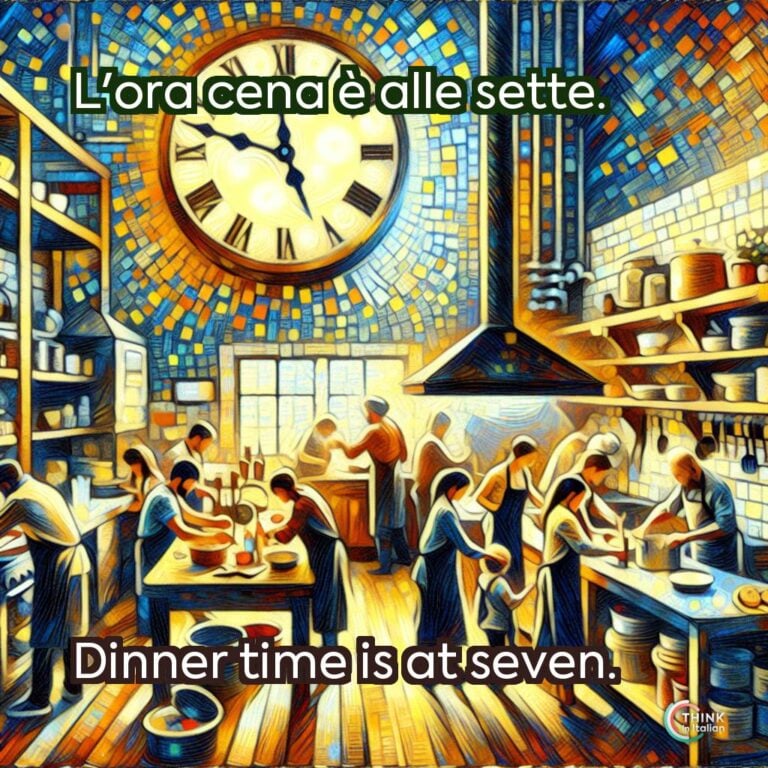“Ora” in Italian
What Does “Ora” Mean in Italian?
The Italian word ora is a feminine singular word which can be used both as a noun and as an adverb. As a noun, it means “hour”, while as an adverb it means “now” and sometimes with “time”.
The difference can be easily guessed by the context of the sentence, as you can see in the following examples:
Dove sei? Ti sto aspettando da un’ora!
Where are you? I’ve been waiting for you for an hour!
Ora sto lavorando, ti chiamo dopo.
I am working now, I’ll call you later.
As I mentioned before, when used as an adverb, ora can also be translated with “time”, as in:
È ora di andare a casa.
It’s time to go home.
Che ora è?
What time is it?
How can I use “Ora” in Italian?
The Italian word ora interacts with different tenses and moods depending on the context it is used in and the meaning it conveys.
- Present Tense
Ora mangio, e dopo vado in palestra.
Now I eat and then I go to the gym.
When used with the present tense, ora is mainly used to order actions in time. This is why it is commonly used together with dopo or poi.
- Present Continuous
Sto studiando ora.
I am studying now.
Here, ora emphasizes the immediacy of the action, as also expressed by the present progressive.
- Past Tense
Ora che ho finito il lavoro, posso rilassarmi.
Now that I have finished the work, I can relax.
Here, it is used in conjunction with passato prossimo. Specifically, the use of the expression ora che is used to indicate the current result of a past action.
Italian Expressions With “Ora”
Fixed Expressions With the Word “Ora”
The Italian language has many fixed expressions with the word ora. The most common ones are:
- non vedo l’ora (I can’t wait!). Literally, it means “I don’t see the hour”, sharing a semantic link with the English alternative translation of “I am looking forward”.
- fare le ore piccole (to stay up until late). The ore piccole (lit., small hours) are the ones that come right after midnight. They are called like that because Italians use the 24-hour clock and, therefore, the hours after 24 are the smallest ones.
- ultim’ora (latest news, newsflash).
Non vedo l’ora che arrivi di nuovo l’estate!
I can’t wait for summer to come again!
Domani devi lavorare, non fare le ore piccole.
Tomorrow you have to work, do not stay up until late.
Ultim’ora: anziano grida contro una nuvola! Aggiornamenti a seguire…
Latest news: old man yells at cloud! Updates to follow…
Other common expressions with ora are:
- d’ora in poi = from now on;
- ora o mai più = now or never;
- ora come ora = right now;
- fino ad ora = up until now. This expression has also been shortened into a single word: finora.
- ora come non mai = now more than ever.
Other Italian Expressions With “Ora”
Given its versatility, you shouldn’t be surprised to learn that ora can be used to form other Italian adverbs:
- allora, which can mean “so”, “then”, or “at that time”, depending on the context;
- ormai, which means “by now” or “at this point”. It was formerly said oramai, composed of ora (now) and mai (never) but this form is becoming obsolete.
Allora, dove vuoi andare a mangiare stasera?
So, where do you want to eat tonight?
Era il 2018. Allora io e Mario eravamo ancora amici.
It was 2018. At that time, Mario and I were still friends.
Jack, ormai è troppo tardi per scusarti…
Jack, it’s too late to apologize now…
E ora…?
And now…?
Now it’s time to practice, as always. As an adverb as well as a noun, the word ora will make part of most of your conversations.
My advice is that you start practicing with the use of ora with expressions of time. Learn how to tell the time in Italian, and unlock all the different ways you can use this word.
Ora I’ll leave you back to your business. Don’t forget to come back to learn more words, and check our free online Italian test to measure your skills and make some practice. Alla prossima!
Learn more about Italian Time expressions.







